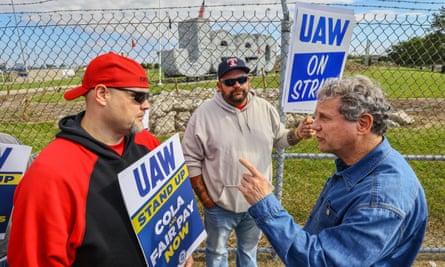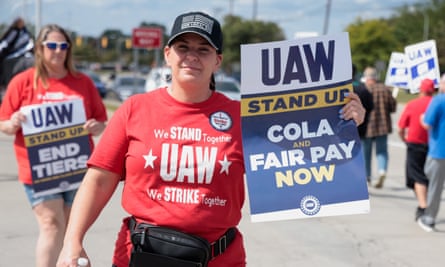Joe Biden on Friday spoke out in support of auto workers as they launched a historic series of strikes after their union failed to reach an agreement with the US’s three largest vehicle manufacturers.
“No one wants a strike, but I respect workers’ rights to use their options under the collective bargaining system, and [I] understand their frustrations,” the US president said in a brief, unscheduled appearance at the White House.
The disagreement over a new contract saw workers at select plants called out from the shop floor to the picket lines shortly after midnight on Friday, kicking off the most ambitious industrial labor action in decades.
The deadline for talks between Ford, General Motors, Stellantis and the United Auto Workers (UAW) expired at two minutes to midnight on Thursday, with the sides still far apart on the union’s new contract priorities.
The strike – which marks the first time all three of the Detroit carmakers have been targeted by strikes at the same time – is being coordinated by the UAW president, Shawn Fain. He said he intended to launch a series of limited and targeted “standup” strikes to shut individual auto plants around the US.
The first walkouts were at a General Motors plant in Wentzville, Missouri, a Stellantis plant in Toledo, Ohio, and a Ford assembly plant in Wayne, Michigan.

They involve a combined 12,700 workers at the plants, which are critical to the production of some of the Detroit Three’s most profitable vehicles including the Ford Bronco, the Jeep Wrangler and the Chevrolet Colorado.
“This is our defining moment,” said Fain during a live stream on Thursday night, less than two hours before the strike was set to begin.
Fain did not rule out broadening the strikes beyond the initial three targets. He said: “If we need to go all out, we will.”
Biden, who had repeatedly declared that he takes pride in being “the most pro-union president” in US history, urged the corporations to “go further”, saying: “Record corporate profits ... should be shared by record contracts for the UAW.”
He added: “I do appreciate that the parties have been working around the clock … It is my hope that the parties can return to the negotiating table to forge a win-win agreement.”
The president also on Friday dispatched two of his top aides to Detroit to help try to resolve the dispute: the labor secretary, Julie Su, and senior adviser on economics Gene Sperling.
Fain later took issue with Biden saying in his brief speech at the White House that union-company negotiations “broke down” on Thursday night. Bargaining is now set to resume on Saturday.
General Motors’ chief executive, Mary Barra, said on Friday morning on CNBC she was “extremely frustrated and disappointed” and that the strike “will not be good for the economy overall”.
She called for a deal to be made quickly and added: “We are ready to keep negotiations going.”
The UAW has a $825m strike fund that is set to compensate workers $500 a week while out on strike and could support all of its members for about three months.
Economists and politicians fear the damage resulting from a widespread, lengthy shutdown.
Stellantis has more than 90 days’ worth of Jeeps in stock, and has been building SUVs and trucks on overtime, according to Cox Automotive.

But a week-long shutdown at Stellantis’s Jeep plant in Toledo could cut revenue by more than $380m, based on the company’s financial reports.
Among union demands are: a 40% pay increase; an end to tiers, where some workers are paid at lower wage scales than others; the restoration of concessions from previous contracts such as medical benefits for retirees; more paid time off; and rights for workers affected by plant closures.
Workers have cited past concessions and the carmakers’ immense profits in arguing in favor of their demands. The automakers’ profits jumped 92% from 2013 to 2022, totaling $250bn. During this same time period, chief executive pay increased 40%, and nearly $66bn was paid out in stock dividends or stock buybacks to shareholders.
Barra, the highest-paid CEO of the Detroit big three, earned almost $22m last year.
Top pay for a UAW assembly-line worker based on the 2019 contract was $32 an hour. Workers now start at $18 and temporary workers receive $15 an hour.
The industry is also set to receive record taxpayer incentives for transitioning to electric vehicles.
Despite these financial performances, hourly wages for workers have fallen 19.3%, with inflation taken into account, since 2008.
The Biden administration is reportedly considering emergency aid for smaller supply firms to the automaker manufacturers due to the strike. Biden spoke to Fain on the status of negotiations on Thursday.

Ford said the UAW’s latest proposals would double its US labor costs. A walkout could mean that UAW profit-sharing checks for this year will be “decimated”, the company said.
GM and Stellantis declined to comment ahead of the midnight strike deadline.
In an earlier video, GM’s top manufacturing executive, Gerald Johnson, said the UAW’s wage and benefits proposals would cost the automaker $100bn – “more than twice the value of all of General Motors and absolutely impossible to absorb”. He did not detail how the union proposals would result in that cost, or over what time frame.
And in an appearance on CNBC on Thursday evening, Ford’s chief executive, Jim Farley, said “there’s no way we can be sustainable as a company” if it were to meet the union’s wage demands.
Barra also said in a letter to employees: “Remember: we had a strike in 2019 and nobody won.”
The contract fight has garnered significant support from the public and US labor movement. Drivers represented by the Teamsters have pledged not to cross the picket line, halting deliveries of vehicles from the automakers throughout the strike. Several labor unions, environmental, racial and social justice groups have publicly announced support for the UAW in their fight for new contracts.
Reuters and the Associated Press contributed reporting